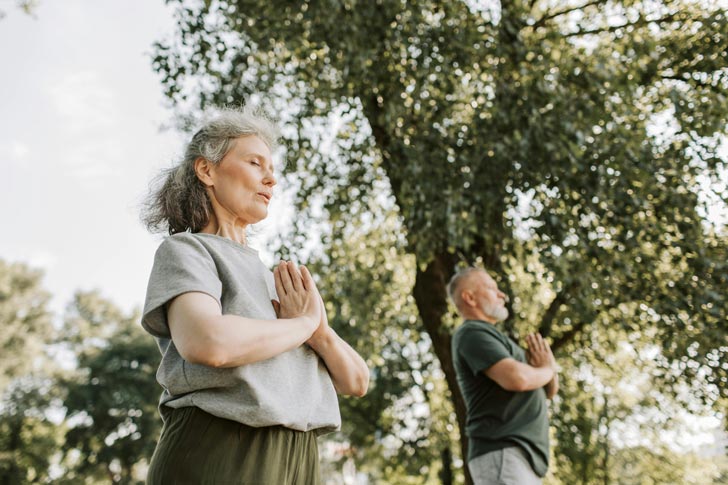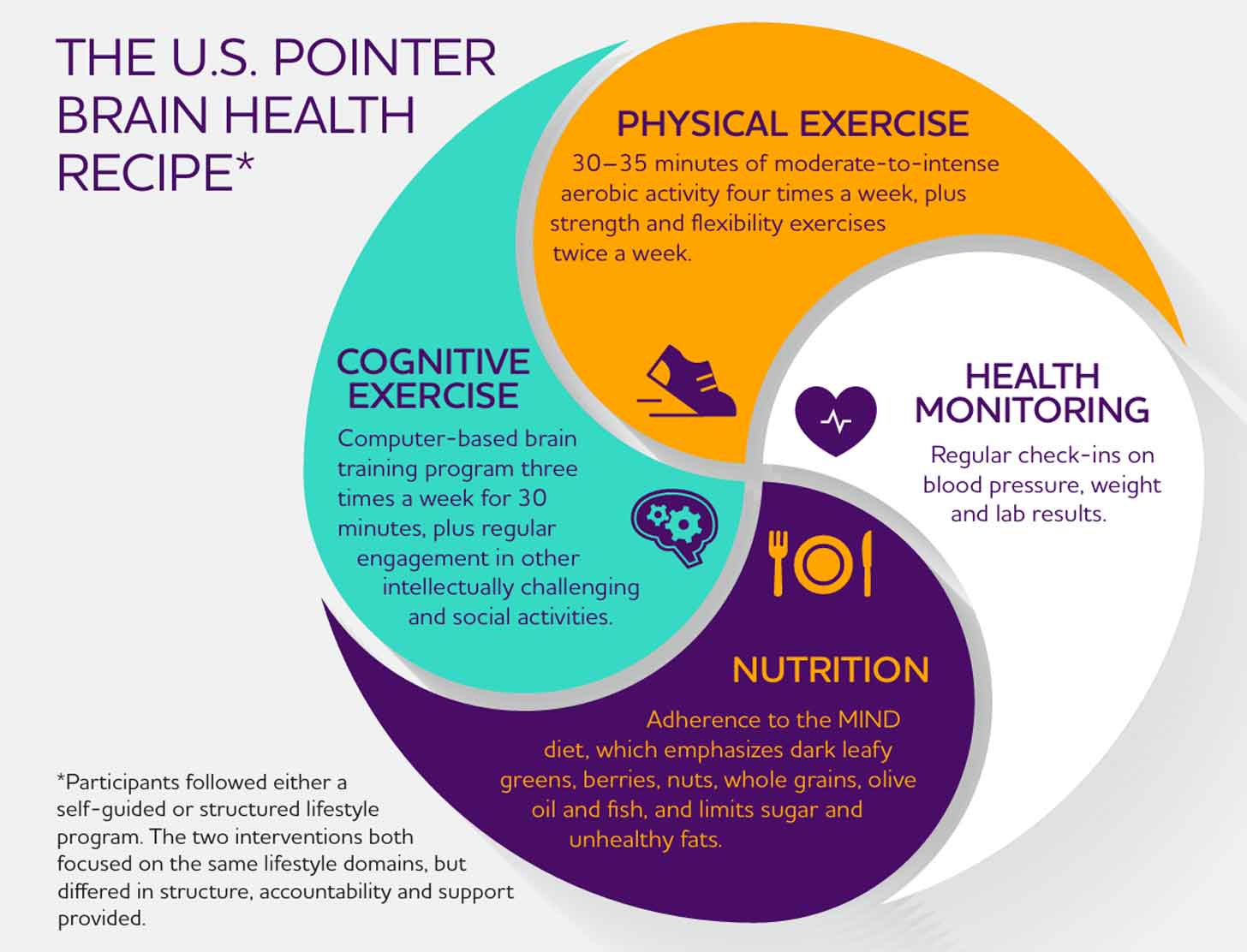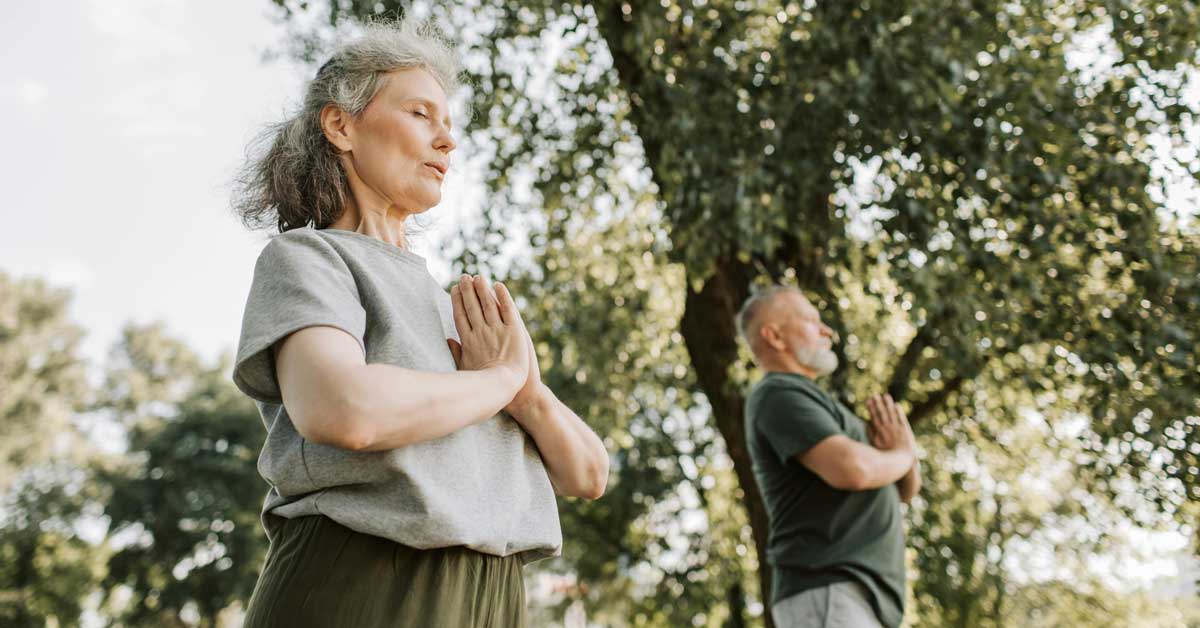The Protect Brain Health Through Lifestyle Intervention to Reduce Risk, or the U.S. POINTER study, has made history as the largest randomized clinical trial in the country to study whether lifestyle interventions can bolster cognitive function as people age.
Findings from the two-year study, led by The Alzheimer’s Association and U.C. Davis Health, have just been published, and researchers have a few suggestions to share.
In a representative population of 2,100 older adults at risk for cognitive decline and dementia, researchers discovered three main lifestyle interventions that improved brain function: Improved diet, exercise, and socialization.

“These are cognitively healthy people between the ages of 60 and 79 who, to be in the study, had to be completely sedentary and at risk for dementia due to health issues such as prediabetes and borderline high blood pressure,” the study’s principal investigator Laura Baker, a professor of gerontology, geriatrics and internal medicine at Wake Forest University School of Medicine, told CNN.
About half of the study participants attended 38 structured team meetings over the course of two years in five different cities across the country. During these meetings, a trained facilitator shared guidance on how to exercise and eat in support of brain health, as well as how to use brain-training games and socialization to improve cognition.
Participants also regularly logged blood pressure and other vitals, and physical and cognitive exams were conducted every six months.
The other half of the study’s participants only attended six team meetings and were self-guided in choosing lifestyle changes that best fit their respective schedules.
In the end, the people in the structured program appeared to “delay normal cognitive aging” by one to two years beyond the self-guided group, though those participants also improved their cognitive scores over time, as well, Baker explained.
“The potential to improve cognition with fewer resources and lower participant burden is compelling,” Baker said in a statement.
“It highlights that while not everyone has the same access or ability to adhere to more intensive behavior interventions, even modest changes may protect the brain.”
Improving diet
Four weeks into the program, teams on the heavily-guided track began the MIND diet — Mediterranean-DASH Intervention for Neurodegenerative Delay, scientists call it.
The diet consists of a Mediterranean diet, but with salt restrictions usually prescribed by the DASH, or Dietary Approaches to Stop Hypertension, diet.
Participants were primarily encouraged to limit fried food, processed meats, dairy, cheese, and butter. Sugary sweets were also more restricted, but participants were still able to have dessert four times a week.
“They gave us a refrigerator chart with foods to limit and foods to enjoy,” 62-year-old participant Phyllis Jones told CNN. “We had to eat berries and vegetables most days, including green leafy veggies, which was a separate item. We had to have 2 tablespoons of extra-virgin olive oil once every day.”
Integrating exercise
Another significant part of the program was to build measurable goals around aerobic, resistance, and stretching exercises. The participants were given YMCA memberships and taught how to use the gym equipment.
The goal was to raise the participants’ heart rates for 30 minutes a day and incorporate strength training and stretching several times a week. Participants wore fitness trackers to monitor their activity.
“After that first 10 minutes, I was sweating and exhausted,” Jones told CNN. “But we went slow, adding 10 minutes at a time, and we kept each other honest. Now I just love to work out.”
Socializing for science
That social component was integral for many of the participants. While cognitive challenges through the BrainHQ app were part of the study, along with other intellectual and social activities, the relationships that grew from these challenges provided their own benefits to participants.
Jones even found her best friend during the program, Patty Kelly.
“At 81, she’s older than me, but we do all sorts of things together,” Jones said, adding, “Isolation is horrible for your brain. But once you get to a point where you are moving and eating healthy, your energy level changes, and I think you automatically become more social.”
The results
Ultimately, the study found significant ties to improved cognitive functioning when these lifestyle changes were in place — even for the team with less professional guidance.
As The New York Times reports, the biggest improvement among both groups was in their executive functioning. Skills like planning and organizing improved, while memory scores did not show much marked improvement, suggesting that vascular changes in the brain could have more of an impact on everyday functioning.
“U.S. POINTER is important because it was designed as a rigorous, randomized controlled clinical trial to demonstrate whether an accessible and sustainable lifestyle intervention protects cognitive function in diverse populations in communities across the United States,” Rachel Whitmer, co-director of the UC Davis Alzheimer’s Disease Research Center and an author on the study, said.
“These positive results underscore the message that healthy behavior has a powerful impact on brain health. Positive actions can make a difference in brain health, and when combined into a program that targets multiple factors like diet, exercise, heart health, and cognitive engagement, we now know it can have an even more powerful impact.”

Now, researchers say, it’s about implementing these interventions in a way that is accessible to the people who need them most.
“Doctors should be treating lifestyle interventions as they would a drug,” Jessica Langbaum of the Banner Alzheimer’s Institute in Phoenix, who was not involved in the research, told NPR.
The findings of this study suggest that prescribing regimens like the one used in POINTER would be a tactful approach to slowing cognitive decline that insurance companies could cover.
More results are still to come from the study, including analyses of brain scans and blood tests that could indicate measurable changes in the brain and body due to these interventions.
“These are the initial results,” Baker said in a statement. “Over the coming weeks and months, study leadership will be exploring all of the data collected in the trial to paint an even more comprehensive picture of the U.S. POINTER intervention effects on brain health.”
In the meantime, Langbaum said that taking on more thoughtful lifestyle changes is never a bad idea.
“If you already do the Sunday crossword puzzle and it's not challenging, pick up something new, find that exercise regimen that you'll adhere to,” she told NPR, “and if you can do it around people, that's even better.”
Header image courtesy of Vlada Karpovich/Pexels



